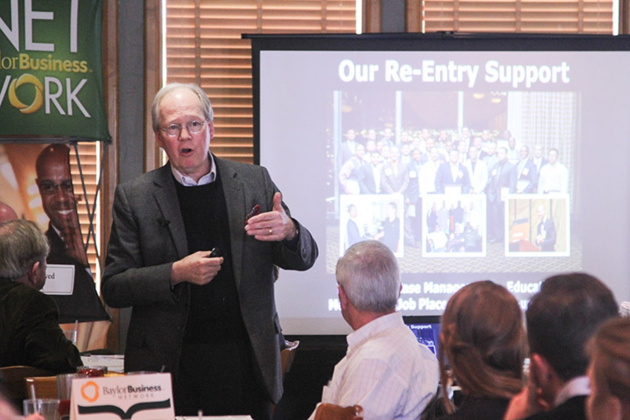
Credits Pat Sullivan
In the United States, former inmates are exposed to social pressure, which combined with a lack of framework when exiting prison, makes reintegration complicated. They fight to find an honest job and are tempted to go back to their illegal occupations, especially since they are often very profitable. And this is exactly what Catherine Rohr, founder of the Prison Entrepeneurship Program (PEP), was interested in. According to her, the skills deployed by a drug dealer are identical to those used by a businessman. The PEP is a university level course and aims to develop the potential of inmates so as they can create their own business once out of prison.
Breaking the vicious circle
This very selective program starts with a call for applicants sent to Texan prisons, proposing inmates to participate in a business plan competition rewarding the best business proposition. In order to be selected, your term of imprisonment may not be higher than four years and you cannot be a sex offender. Participants are taken care of by volunteers and business professionals for five months, after which they must present their project in thirty minutes in front of a jury composed of business leaders. A prize for the best project is given during the graduation ceremony. “It will be their first time wearing a cap and gown for half of our students. And we have invited members of their families so they can be proud of them, maybe for the first time. It is not on Wall Street that you can witness moments like that.” says Catherine Rohr.

Richard Chavez Jr is a participant of the program. He is planning on creating a reception and counseling center for young people in 2020. “My whole life I’ve been egocentric, he says. Now, I must give back”. He estimates his project will cost 50,000 dollars and is actively seeking funding. Beyond contributing to society, inmates’ projects also ensure employment, as they will become business owners. Since 2004, 165 of PEP’s graduates have successfully opened businesses. The blog iwasinprison gathers testimonies, insisting not only on the opportunities given by this program, but also on the emotional changes of prisoners. « Thanks to PEP and the ten core values, I am a different man » says José M. from the 20th graduating class of the program.
Much more than economics class
The Ten fundamental values, those are the rules inherent to the PEP that everyone, inmate, teacher and volunteer have to follow. Reliability, love, second chance, the ethics of the program define themselves in these lines. However, inmates must familiarize themselves with this new vocabulary with a view to their future reintegration in the job market. Courses are therefore supplemented with workshops to raise awareness about respect – for women, among others- good manners and oral communication. In the United States, overpopulated prisons give a tense atmosphere of insecurity. The PEP offers a friendly and caring place that puts all individuals on an equal footing. When arriving, inmates and volunteers are purposely given cute nicknames such as Sweet Sugar or Chocolate Truffle, a self-mocking way to create a family-like atmosphere in the austere environment of a detention center.
It is precisely families that are at the heart of the inmates’ motivations. Al Massey – or nicknamed Granny Panties by his mates from the 9th graduating class –is telling his story. Grateful for the second chance he was given, he expects to take advantage of the lessons learned from the PEP to “measure up to his father”. Most inmates admit to have been quite selfish in the past, like him, and are now inspired by the program to give a more spiritual meaning to their lives. Religion is actually very prominent in the PEP, notably because of the great number of partnerships with churches contributing to funding the program.
A growing influence
Since the program was set up in Cleveland’s detention center in 2004, an increasing number of partnerships with universities have enriched the program with qualified professors. Hankamer business school (Baylor University) is involved in teaching entrepreneurship and evaluated the course to be of university level. A graduation ceremony naturally took place on this same initiative. The PEP diploma has therefore a real value that increasingly ensures visibility at national level.

Since funding has been fully covered by private donations and receives no state aid, it is crucial to ensure the future of the PEP by guaranteeing a network of reliable donators. In December 2014, the Scurlock Foundation, a private donation organization that subsidizes philanthropist and volunteer projects, gave a grant for five years to help with the expansion of the PEP through the whole of Texas. Thanks to these subsidies, the PEP has already started to flourish in a second prison.
The initiative to empower prisoners to facilitate their reintegration has proven to decrease recidivism. It seems like the US penitentiary system is gradually taking a similar approach to the one of open Scandinavian prisons, where inmates’ rehabilitation is at the center of all attention, rather than being put aside.






























